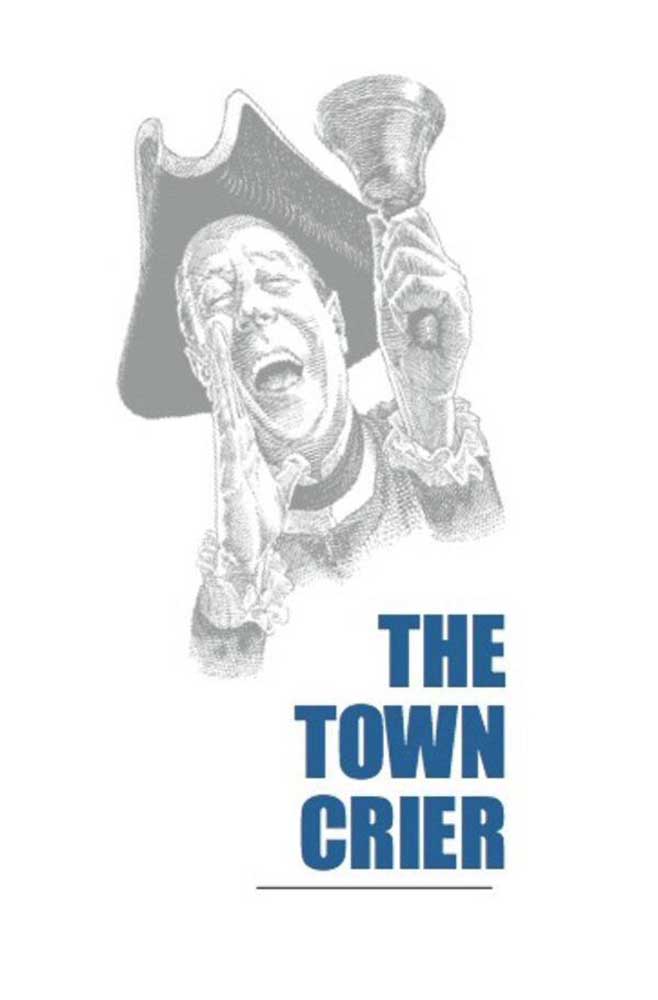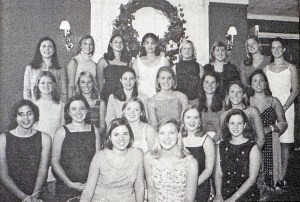The Town Crier: DLT forever (part one)
Published 8:00 am Sunday, February 18, 2024

- The Town Crier
I came across an article from the Dalton paper (yes, this one) from 1966 that declares it contains the “Authoritative History” of the Dalton Little Theatre. That means from the time the article was written we have had 57 more years of history for our namesake amateur thespian organization.
It’s claimed Dalton has the oldest ongoing little theater in Georgia. Another first for Dalton/Whitfield. Going by different names over the years, such as The Dalton Amateurs, The Sophoclean Dramatic Club and in 1955 chartered as the Dalton Little Theatre, the stage stayed lit. Two ladies put forth the info in the article, Louise McCamy and Emily Davies, both connected with both Dalton history and the Little Theatre.
Trending
A pretty good pedigree
In 1966, the 11th season of the newly designated DLT, the premier would be “You Can’t Take it With You,” a screwball comedy from 1936 written by George S. Kaufman and Moss Hart. Hart’s wife was Kitty Carlisle, who you may remember as a panel member on game shows in the ’50s and ‘60s and on reruns. Kaufman wrote hit plays and also scripted some of the Marx Brothers movies.
The play won the ’37 Pulitzer Prize for Drama, and was made into a movie in 1938 directed by Frank Capra. I don’t know when they’ll do the play here again, but until they do you can check out the movie. The movie won the Academy Awards for Best Picture and Best Director. That’s all a pretty good pedigree for the season opener in ’66.
That play would be directed by Chattanooga’s Miss Betty Peruchi, whose parents (aka “Ma and Pa Peruchi”) had headed a traveling band of players who took the stock touring company The Peruchi Players on the road, including to Dalton. The play was going to be performed in the theater of the Dalton Junior High School, which would at that time be in the old Emery School.
Side note: I was in plays on that stage in junior high in the ‘70s. It’s an “intimate” theater, as they call it in showbiz, meaning “small.” The decision had been made to start a fundraiser in the first of the next year, 1967, in order for the Little Theatre to purchase and transform the old “Teen Town” building into a permanent home for the Dalton Little Theatre. Teen Town was an old Quonset hut building, I believe, that was started as a kind of clubhouse for the town’s teens to come and dance and have parties. Better than roaming about bored and getting into trouble, don’t you think? Maybe we should have a Grownup Town as well!
Studying the history
Trending
At that point in the article Mrs. Emily Davies took over as expert on the history of amateur theater in Dalton. In 1966 she was the chairman of the board for DLT and had studied the history, much of it gleaned from old newspapers and those that had been performing in decades past.
Initial performances of live, amateur theater are recorded shortly after the Civil War in the 1860s, while the South was still occupied during Reconstruction. The Dalton Amateurs did well in the second half of the 1800s, with Trevitt Hall hosting many of the shows. The Trevitt Hall facade still stands, although the original building in the back burned down a few years ago.
An early production mentioned in the papers was an 1876 production of “Green Mountain” by the Dalton Amateurs. It’s not mentioned what the play is about, but there are a couple of clues so we can make a guess. The newspaper editor of the day states the actors were praiseworthy but that the language in the play was filled with “low, down-east slang.” “Down-east” means Maine and New England, especially along the coast. And, since the play was put on in 1876, that would have made it the centennial of Vermont’s Green Mountain Boys from the American Revolution, so perhaps the story was about those patriots.
A hit of 1885 was “Peck’s Bad Boy,” based on a series of books. The first one was written in 1883, with the play appearing in 1884 and the Dalton production coming in 1885. That’s a pretty fast turnaround for a local theater group. In the 1966 article Mrs. Davies mentions they were thinking of re-staging the play to honor the earlier generation of playmakers. I’ve seen a poster for the DLT modern production of the play, I believe from the late ’60s or early ’70s, so that plan came to fruition. If you’re interested, there’s a 1934 film version.
In 1904 a Dalton dramatic group named their company the Sophoclean Dramatic Club and kept the plays coming. Initially thinking to bring in a company to perform from elsewhere, Miss May McAfee, a famous performer known throughout the state of Georgia, told them they should put on the play themselves. They agreed.
That first show was “Why Jones Left Home.” It opened to a full house in the old Dalton Opera House (which burned in the 1911 downtown fire). Now get this: In 1966 there were still two Daltonians who had been members of that dramatic club! Those are 62-year-old memories!
Mrs. Emily Davies reports that Mac Roberts remembered the audience “laughing uproariously during the serious scenes.” and Mrs. Cora Brown, who had performed the character that led Jones to leave home, remembered being left alone on stage because the other actor missed his entrance. The show must go on, so she pronounced her line “Now we are at last alone!” Indeed. There’s nothing lonelier than being onstage alone or when the actors “go up” (forget) their lines. The money raised went for a fountain that used to be where Thornton and Selvidge Street form a “V,” a fountain I remember as a kid, and where later a splash pad sprayed for a few years.
Selling a cow
Miss May McAfee directed the theatrics for years and after she passed, her niece, Mrs. Janice Meadows, took over the reins. (I remember “Miss” Janice when I was a young teen and doing some plays at Dalton High.) At that time the Dalton performers didn’t just do shows in Dalton, but took the shows to surrounding towns as well, looking for any place that would work as a stage and wanted entertainment. Mrs. M.E. Judd (of the Judd House Judds) was the business manager, and after one out of town engagement that did not rake in the ticket bucks, claimed that the show was so broke that she was going to have to sell her best cow to keep the group going. (Sounds like a good ploy to play off folks’ kind hearts to raise donations if you ask me.) The proceeds from these plays went to fund the Crown Mill kindergarten. This is the World War I era group that took plays to the soldiers in Fort Oglethorpe to perform for the soldiers stationed there.
After the war, in the 1920s era, the production and presentation of plays was conducted by the Dalton Women’s Club and the Lesche Club, the oldest chartered women’s club in Georgia. (Another Dalton first!) Some of the Dalton plays performed at this time included “The Man Who Married a Dumb Wife” (I bet I could predict who the real dummy was by the time the curtain dropped), “Love In a Mist”, “Enter Madame” and “Six Cups Of Chocolate.” There was even an original musical called “Cohutta,” written by Mrs. Gertrude Manly Jones and featuring a large cast. DLT just a few weeks ago produced another locally written and composed musical called “Click” and if you saw it you’d be as proud of theatrical talent here now as they were then.
In the late 1930s, during the Depression, “Miss Janice” (who at the time of the 1966 article was on the board of directors of the DLT) formed what was called The Dalton Players, the latest title by which the ongoing theatricals continued. Plays performed included “Night Must Fall,” “Duley,” “Three-Cornered Moon,” “Little Women” and “Night of January 16th,” a story about a murder trial. The play was performed in the courthouse to add verisimilitude to the production. A group coming to see the play thought it was an actual trial (I guess they got there a little late) and wanted a refund.
It was during a rehearsal on a December Sunday afternoon that one of the members rushed in with the report from Pearl Harbor. The lights would dim in theater productions here during the course of the war, and it wouldn’t be until after the Korean War that the Dalton performers would get back together as the Dalton Little Theatre in 1955.
Next week we’ll bring the Dalton Little Theatre up to date.
Mark Hannah, a Dalton native, works in video and film production.





